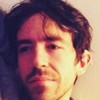Image courtesy of HarperCollins/Ecco
Advertisement
but music stinks
I sit in nature
typical oinks typical bahs, neighs
& whinny
typical doodle
bloooo
ka-thunk ka-thunk In me speaks
the divine
menagerie
the nectar
the blood on my hands Girls Girls Girls!
I came to prayHarperCollins just published Myles's I Must Be Living Twice, a collection of selected and new poetry that spans her entire career. In honor of that occasion I caught up with her to discuss how this anthology is "truer" than any autobiography she could write, and how New York has changed since the years when it was a reasonable goal to live in the city and pursue a career in poetry.VICE: How did you come to put together I Must Be Living Twice?
Eileen Myles: In a long, slow way. When I was in San Diego in 2007, somebody asked me for poems for an anthology of American female poets to be published in Italy. It was very easy to think about which poems of mine I would like to see translated into Italian. The kind of vernacular poetry I write, it's like those candies that burst when you put them in your mouth, so I thought about which ones would burst well in Italian.
Advertisement
Yes, absolutely. In fact, it's a truer autobiography or biography or memoir than I will ever write.When I was much younger in my poetry practice, I remember hanging out with another poet and she showed me this book. I can never remember if it was Li Po or Tu Fu, but it was a Chinese poet. It was a slim volume and it was his childhood poems, his adolescent poems, and his young man poems. That's a form that I think about a lot.I've been thoroughly moved byTruffaut and his whole Antoine Doinel character [the filmic alter ego of Francois Truffaut]. I love the idea of being an artist who narrates the moments of being alive, all the stuff one takes and takes in. So that's what I wanted to do. Anything that ever happened to me is represented, on some level, in this book.
Eileen Myles via Flickr User MTA
The East Village, and even just New York, period, was like a writing factory for me when I arrived. I had to rethink everything. I grew up in Boston, where every cab driver was writing a novel and every waitress was taking dance lessons. Everybody was on the way to something. And when I got to New York what was so exciting was to realize that here they were actually doing it now.
Advertisement
It's not just the city that's changed, though. Being gay means something very different now then it did when you first started writing poetry. It used to be that queer stories couldn't be conventional, and so to some degree, they had to be told in experimental forms. Now that that's not true anymore, is formal experimentation still as necessary for queer artists?Read on Broadly: Mexican Painter Alida Cervantes Dips Her Brush in Sex and Violence
I still feel like there's lots of problems just being in the world with my queer body. The experience of traveling, which I do a lot, is always an assault on my gender. I'm renovating my website right now and I'm going to have a Tumblr called "Ladylike." The joke is that I really hate the word lady. I just want to put a knife through somebody's heart when they go "Hey lady!" I'm not a lady. I have never been a lady in my life!
Advertisement
Oh sure! But not because that's what they have to do. When I was in my twenties, Ted Berrigan would say a poet has to move to New York. And I don't know if I would say that, but if you want this experience, it's here. And there's so much in it. It's abundant and confident and challenging and complicated and dirty and fucked up and great.I Must Be Living Twice is out now via HarperCollins and can be purchased here.Follow Hugh on Twitter.
